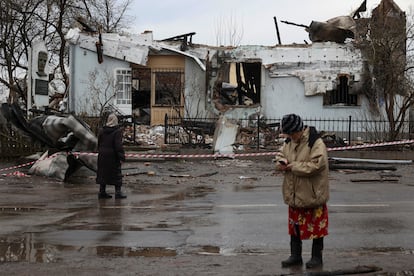An uncertain 2024 for Ukraine
European solidarity cannot give in to the fatigue of a war that Putin is prolonging in search of a favorable horizon

The United States has announced a military aid package for Ukraine of $250 million, which will be the last if the Republican-controlled Congress does not authorize the release of $61 billion in new funds, which it is tying to new and more restrictive measures related to immigration on the border with Mexico. Nor has the European Union managed to approve its €50 billion aid package for Ukraine due to the opposition of Hungarian Prime Minister Viktor Orbán, although Brussels has some leeway to tap into a multilateral fund of €20 billion outside the EU budget. The year has ended badly for the Ukrainian war economy, since to the setbacks in international solidarity must be added the internal difficulties that the lack of funds will cause in the working of its Administration. Two million government employees and one million recipients of social assistance could be left without income.
Despite persistent declarations of solidarity, the allies’ fatigue is undeniable. The sensitivity of world public opinion is now more focused on the Hamas attack and Israel’s slaughter and destruction of the Gaza strip than on Putin’s war in Ukraine. There has been no significant progress there in the military field in recent months, but the intensity of the attacks has grown in recent days. Last Tuesday, Ukrainian forces targeted the battered Black Sea Fleet, knocking out the Russian landing ship Novocherkassk, and on Saturday and Sunday they bombed Belgorod and other cities in southwestern Russia. In response, Putin has kicked off the new year with a storm of drone bombs throughout Ukraine.
The setbacks suffered by Russia since the beginning of the war find an effective counterpart in its endless recruiting capacity and its indifference to fatalities that the United States has estimated at more than 300,000 in the 23 months of fighting. The massive use of poorly prepared recruits, thrown against Ukrainian trenches to die, is what explains the insignificant advances that have been made on the front. Also notable is Russia’s ability to resist Western sanctions and find systems to circumvent them. If we add to this the increase in the production of its military industry and the supply of ammunition by North Korea and Iran, we can understand the parsimony with which Putin is handling a war that he wants to prolong as long as possible. Only the conditions of an increasingly implacable authoritarianism, exemplified by the cruel prison treatment of the opposition leader Alexei Navalny, allow Putin to cover up his military failures. The duration of the war and the unscrupulous use of the population as cannon fodder allow him to wait until the situation becomes favorable.
Any decision on the future of the war, and especially on an eventual ceasefire, concerns only the legitimate government in Kyiv. European solidarity must not give way, neither to Orbán’s vetoes nor to general fatigue. In any case, it is advisable to maintain a realistic view of the prolongation of the war, to which the increasingly probable return of Donald Trump to the White House may contribute decisively to the detriment of Kyiv. The European Union must be prepared to face the blow that the departure of the United States would mean for the cohesion of the Atlantic Alliance, and to assume in such case all the demands of solidarity with Ukraine.
Sign up for our weekly newsletter to get more English-language news coverage from EL PAÍS USA Edition
Tu suscripción se está usando en otro dispositivo
¿Quieres añadir otro usuario a tu suscripción?
Si continúas leyendo en este dispositivo, no se podrá leer en el otro.
FlechaTu suscripción se está usando en otro dispositivo y solo puedes acceder a EL PAÍS desde un dispositivo a la vez.
Si quieres compartir tu cuenta, cambia tu suscripción a la modalidad Premium, así podrás añadir otro usuario. Cada uno accederá con su propia cuenta de email, lo que os permitirá personalizar vuestra experiencia en EL PAÍS.
¿Tienes una suscripción de empresa? Accede aquí para contratar más cuentas.
En el caso de no saber quién está usando tu cuenta, te recomendamos cambiar tu contraseña aquí.
Si decides continuar compartiendo tu cuenta, este mensaje se mostrará en tu dispositivo y en el de la otra persona que está usando tu cuenta de forma indefinida, afectando a tu experiencia de lectura. Puedes consultar aquí los términos y condiciones de la suscripción digital.









































